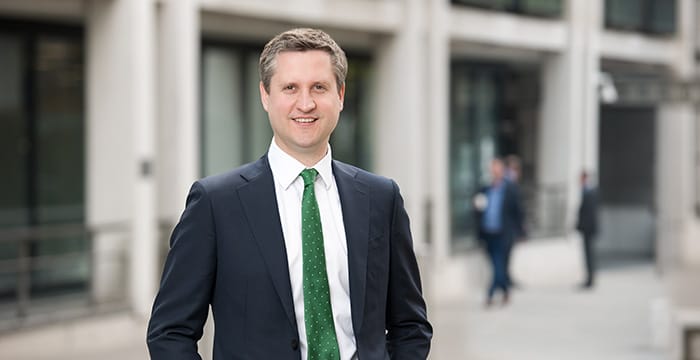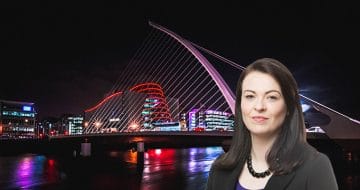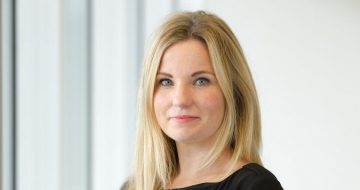One Pinsent Masons partner shares his insights

When a new case comes in “it’s like a big game of chess”, says intellectual property (IP) disputes lawyer Christopher Sharp, a partner at Pinsent Masons. “That’s when we’re really getting under the skin of the case and asking what exactly is the invention we’re trying to protect. We work out our litigation strategy, deciding which countries to litigate in, and in which order. It’s the point where we make most of the interesting tactical decisions.”
Protecting a patent, trade mark, copyright or design right often involves some in-depth science or technology. Sharp, a solicitor-advocate who specialises in patent disputes in the pharmaceutical sector, has a chemistry degree from Bristol University and worked as a research scientist at Novartis, a Swiss pharmaceutical company, for a year before switching to law. While advantageous, a science or IT background is not necessary — a number of members of Pinsent Masons’ IP team (including partners) do not have science backgrounds but have worked on many life science cases. That’s where the experts come in — another highlight for Sharp. He says:
“We appoint experts to help us and they are high-quality professors, leaders in their field, really interesting people and we learn a huge amount from them. Usually, as we progress through the case, we see them become more interested in the law as they see the tactical decisions that we’re making, and begin to understand what we do and why, which is quite nice.”
So, how do you become an IP lawyer?
“All backgrounds are useful and it is good to have a diverse spread of skills in the team, for example, languages, history, scientific or technological knowledge, it all comes in handy but there are no particular specialist requirements. For example, we have been working on a branding issue involving issues in China — one of our team can read Chinese text, which has helped; on another case, the client is Israeli and we also have a Hebrew speaker in the team. IP is a relatively specialist area of law and cases are quite complicated so what is key is having a will to understand. You will need an analytical mind, the ability to process heavily technical information and keep on top of it, and be super-organised, particularly when working on litigation at the pan-European level,” Sharp explains.
He continues: “If you want to be an IP lawyer remember that you need to want to be a lawyer, that’s our job first and you must go through the same steps as everyone else. Try to do a vacation placement, get work experience at your local solicitors’ firm or law centre. Go to a court and watch a trial. I went to the Old Bailey and found the criminal trials there fascinating, and it gives you something to talk about at interview, demonstrating your interest. Do a mini-pupillage if you can — they are great experience. Also, be passionate about your degree, talk about what you find interesting and bring it to the attention of your interviewer.”
He became interested in law after attending a graduate law fair and applying for a vacation scheme at Herbert Smith Freehills. He attended BPP Law School, accepted a training contract at Herbert Smith (as it then was) in 2005, became involved in a chemistry-heavy IP case during his traineeship, loved it and stayed for nine years at the firm before joining Pinsent Masons as a senior associate. He was made a partner in May 2018.
IP lawyers tend to travel a lot since their cases usually involve parallel proceedings in other countries, particularly Europe and the USA. In the past year, Sharp has visited San Francisco, Boston, Munich, Paris, Brussels and Madrid for work, and is currently working on a case involving a dispute in Australia.
Pinsent Masons, which is expanding and recruiting in its IP practice, has eight IP partners, 20 associates and six paralegals in its London team as well as teams in Birmingham, Leeds and Scotland. London has a mix of specialisms: four people focus on pharmaceuticals, one person specialises in technology and telecoms, one person does brand enforcement, one person is a trade mark attorney, and one person handles non-contentious IP in life sciences. Overall, IP is a growth area. Sharps’ team is very busy and he believes it’s the same at other firms. Businesses are increasingly keen to enforce their rights and the English courts have a strong reputation worldwide for IP law.
Thankfully, Brexit does not particularly affect IP. It could, however, through no fault of the Brits, claim a high-profile victim. One current hot topic is the Unified Patent Court (UPC) — the pan-European 25-nation patent regime poised to transform the IP field. Currently, the UK has ratified the agreement and a site at London’s Aldgate Tower has been selected to host the London court although no judges have yet been recruited. Germany, however, is waiting on a constitutional case currently before its domestic courts to conclude before it can ratify and, in order for the UPC agreement to go ahead, it must be ratified by Britain, France and Germany, all three of whom must be EU members at the time. If the German constitutional case does not conclude before Brexit, therefore, the agreement will fall. Unfortunately, according to Sharp, general opinion is of the view that in these circumstances the agreement will not be renegotiated despite several years of preparation.
About Legal Cheek Careers posts.


